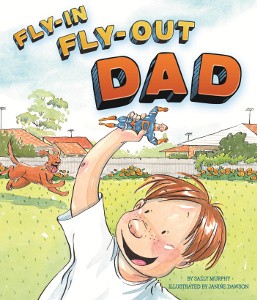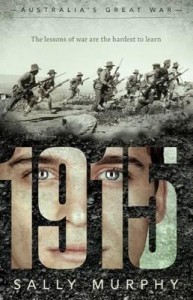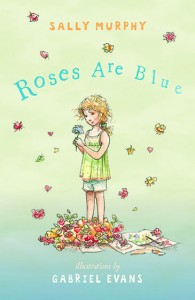As I talked about books and writing during my Bookweek visits, I used my three latest books – Fly-In Fly-out Dad, 1915, and Roses are Blue – to demonstrate where ideas come from, and how an idea can be moulded into a story. In most sessions I referred to all three books because I felt that using such diverse books would mix things up a bit. But, after a week of discussing three very different books, I started to realise that while they are very different, these three books had quite a lot of similarities.
 All are about absence, and missing loved ones. In Fly-in Fly-Out Dad Tiger misses his Dad, and Dad misses his son. Even when they are together they realise that soon they will be apart again. In 1915 Stanley, fighting at Gallipoli, misses his family desperately, and probably his twin sister Elizabeth most of all. And Elizabeth, at home in Australia, misses Stanley, and worries about him every day. In Roses are Blue, Amber misses her mum, even though Mum is still with her. She misses the way Mum was before her terrible accident, and the things they could do together which they now can’t.
All are about absence, and missing loved ones. In Fly-in Fly-Out Dad Tiger misses his Dad, and Dad misses his son. Even when they are together they realise that soon they will be apart again. In 1915 Stanley, fighting at Gallipoli, misses his family desperately, and probably his twin sister Elizabeth most of all. And Elizabeth, at home in Australia, misses Stanley, and worries about him every day. In Roses are Blue, Amber misses her mum, even though Mum is still with her. She misses the way Mum was before her terrible accident, and the things they could do together which they now can’t.
 All three feature strong child characters.Tiger is only little, and struggles to understand where Dad goes, and even why they can’t always be together, but he tries to be brave about this. It’s important though, that he is able to recognise that being ‘brave’ doesn’t mean he isn’t allowed to miss his dad or to feel sad about Dad’s absences. In 1915, Stanley and Elizabeth are not children – though as young teachers they really aren’t much past their teenage years. And they are both strong individuals. But to me, the child characters who strike me as strong here are Miles’ sons, Bobby and Harry , who Elizabeth teaches. They represent the many many children who, in World War 1 (as in other armed conflicts) watched their fathers go off to war, not knowing if they’d come back. And (spoiler alert) when their father does die, they do their best to carry on their lives. In Roses are Blue, Amber too has the strength to carry on, trying hard to be happy, to support her family – especially her baby brother, Jack – and to make the most of what she’s got.
All three feature strong child characters.Tiger is only little, and struggles to understand where Dad goes, and even why they can’t always be together, but he tries to be brave about this. It’s important though, that he is able to recognise that being ‘brave’ doesn’t mean he isn’t allowed to miss his dad or to feel sad about Dad’s absences. In 1915, Stanley and Elizabeth are not children – though as young teachers they really aren’t much past their teenage years. And they are both strong individuals. But to me, the child characters who strike me as strong here are Miles’ sons, Bobby and Harry , who Elizabeth teaches. They represent the many many children who, in World War 1 (as in other armed conflicts) watched their fathers go off to war, not knowing if they’d come back. And (spoiler alert) when their father does die, they do their best to carry on their lives. In Roses are Blue, Amber too has the strength to carry on, trying hard to be happy, to support her family – especially her baby brother, Jack – and to make the most of what she’s got.
 All three make people cry. I spent a lot of time during Bookweek (as with all my appearances, really) discussing why I choose to write books which rouse emotion. Though I don’t set out to make people cry, I’m kind of glad that I am able to connect with people in this way. And my aim is, that even when someone cries reading one of my books, they should feel happier afterwards.
All three make people cry. I spent a lot of time during Bookweek (as with all my appearances, really) discussing why I choose to write books which rouse emotion. Though I don’t set out to make people cry, I’m kind of glad that I am able to connect with people in this way. And my aim is, that even when someone cries reading one of my books, they should feel happier afterwards.
There are probably other links between the three, and between these and my other books. Perhaps the biggest link is that, because they were written by me, inside each and every one of my books is a piece of me. Intentionally or otherwise, I put myself on every page. It’s one of the fun parts of being an author.